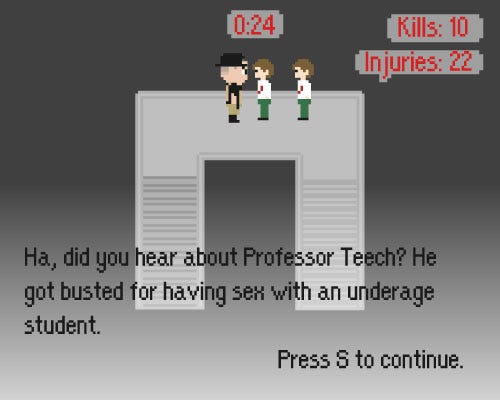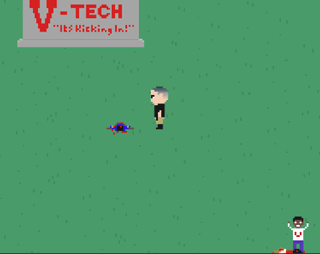Trending
Opinion: How will Project 2025 impact game developers?
The Heritage Foundation's manifesto for the possible next administration could do great harm to many, including large portions of the game development community.
In his latest Persuasive Games column, Ian Bogost looks at the controversial V-Tech Rampage Flash game, which deals with the Virginia Tech tragedy, asking: "If V-Tech Rampage offers an example of an unsophisticated, negligent take on the tragedy, what would a thoughtful, conscientious one look like?"

A month after the Virginia Tech massacre, 21 year-old Australian hobbyist animator and game developer Ryan Lambourn created V-Tech Rampage, a web game that recreates the massacre’s events. He released the game on his personal website and popular Flash portal Newgrounds.
The game was universally reviled on websites and blogs. Some cited the very idea of a game about the massacre as an offense (“We just find such a game to be in extremely poor taste”).
Others noted a lack of sensitivity in the timing of the game (“[Lambourn] waited less than a month. Which suggests that [he] is motivated primarily by getting his name in the limelight”).
Elsewhere, still others cited the game’s structural coherence and other design merits (“If you don't follow the plan accordingly, the cops capture you early. If you walk into a classroom, the game engine makes the walls transparent. When you fire shots near pedestrians, they'll freak out and start screaming and running”).
And most highlighted Lambourn’s demand for payment in exchange for removing the game from Newgrounds and his own site, including the apparently thoughtless offer to apologize if donations reached $3,000 (Lambourn later retracted the offer, claiming it was a joke).
The game has been compared to another controversial and highly-publicized videogame about a school shooting, Danny LeDonne’s Super Columbine Massacre RPG (SCMRPG), but the two games share little in common.
While SCMRPG portrayed Eric Harris and Dylan Klebold’s lives in researched detail, depicting the events of the Columbine massacre as the tragic outcome of two complex and misunderstood lives, V-Tech Rampage focuses on the acts of killing over the killer’s motives. While SCMRPG defamiliarizes murder by rendering it in RPG form, V-Tech Rampage encourages fast-fingered triggering.
While LeDonne has thoughtfully and convincingly connected his game with the personal effects Columbine on his life, Lambourn’s game makes him appear unstable at best, deeply troubled at worst.

One might even wonder if authoring the game was actually more a signal of his own disquiet than the offhand gag he claims it to be. For example, in V-Tech Rampage, the victims utter revealing secrets before the player mows them down. These range from the cynical (“Please just not my face! I want to stay pretty!”) to the disturbed (“I cut myself sometimes”) to the homophobic (“Bring the pain, faggot!”) to the melancholy (“I’m lonely”).
Several deal with sexual molestation, including one final lament, “I wanted to have sex with a preteen before I died,” and another rejoinder accusing a professor of having sex with an underage student.
The world probably didn’t need V-Tech Rampage. But what if Ryan Lambourn did? Are these just tasteless jokes, or are they calls for help?
In one of the earliest mentions of the game, Entertainment Consumers Association (ECA) website GamePolitics was quick to condemn it for inviting scorn from politicians that might harm the industry. Wired games blogger Susan Arendt agreed, suggesting that “it's wrong to compare, however obliquely, a work of pure fiction to a game that turns the death of actual people into entertainment.” Others followed suit, in newspaper articles, in blogs, in comments on Lambourn’s website.
Today, a month after Lambourn first released the game, discussion of it has all but disappeared. Some might point to this fact in an argument for the game’s insignificance; it spurred little reaction save shock and disapproval. A web forum set up by a third party to discuss the game has logged no more than five total posts.
But I do not believe we ought to forget, or hide, or disavow this game.
In an edition of his regular column on politics and videogames from February 2007, Dennis McCauley wrote the following of Super Columbine Massacre RPG:
"…whatever Ledonne's purpose in creating SCMRPG, the negative mainstream publicity surrounding the controversial game is not good for the video game industry. Game publishers ought to be proactively making it clear that Super Columbine Massacre isn’t a product of their tribe.
Why? Because the idea that a game company might be so craven as to profit from the Columbine massacre is hurting the industry. Because non-gaming types simply don’t understand the difference between LeDonne's self-made art project and a multimillion dollar commercial game product like, say, Rockstar's Bully."
McCauley has evidence to back up his concern, including a Utah legislator’s mistaken identification of an ESRB rating for the game. But I object to his suggestion that creating a game that profits from Columbine would be a spineless act. More gutless is the industry’s general refusal to tackle the challenge of making games about thorny issues, or of McCauley and others’ tendency to support the industry over the medium.
If V-Tech Rampage offers an example of an unsophisticated, negligent take on the tragedy, what would a thoughtful, conscientious one look like? This question cannot afford to remain hypothetical any longer. So I hereby issue a challenge to the videogame industry: to create a videogame about the Virginia Tech tragedy. One worthy of reflection. One that captures the event’s despair as well as much as its brutality. One that the public can respect even if it makes them uncomfortable.
How would such a game tackle the issue respectfully? There are innumerable possibilities.
As a university professor, I’ve felt the awkward uncertainty of the “Post-VT” academy first-hand. While I surely empathize with the families of the dead, I also often wonder about the surviving faculty at Virginia Tech who had encountered Cho. What kind of guilt must they feel? Is it justified? Term after term, class after class, how does one know for sure that a student is deeply troubled? How deep does it need to be to recommend intervention? What kind of intervention would it be? How do the institutional politics of the university facilitate or impede such actions?
What about Cho’s own family? Was their trust in the church as a solution to their son’s problems a pious act of devotion or a foolish and costly naiveté? How does their ethnicity contribute to the innocence or guilt they feel, or the blame they have received?
What does it mean that Cho was so frequently called the “South Korean Shooter” in the media, while Harris and Klebold were never labeled “Caucasian Shooters”?
What about the terror of Norris Hall, of being stuck in a compromised classroom with only moments to decide how to react, moments complicated by the fear and terror that undermines rational thinking? Is one’s fate a matter of luck alone, or a function of the physical properties of the building and the room?
What about the issue of campus security, previous threats, and the possibility that a lockdown would have prevented the worst of the casualties? How does one plan security and evacuation of a large, scattered environment like a university? Whose lives are more important during tragedy, students or faculty, staff or maintenance workers?

There is no timeframe for this challenge, no assumption about the number of months or years required to move from mourning to contemplation. But I mean it.
I challenge the industry to do better than the homebrew hacks McCauley would have us banish. I want a proper game, in a box, in the store, just like United 93 and Elephant and Munich share shelf space with Con Air and Bad Boys and Coyote Ugly.

All of the themes above, and many others yet unthought, are well within our means to implement. They do not require advances in rendering technology or novel input devices or upgraded physics middleware. They merely require the resolve to care about this tragic event enough to want to try to make sense of it, as best we are able, in our own medium.
Read more about:
FeaturesYou May Also Like